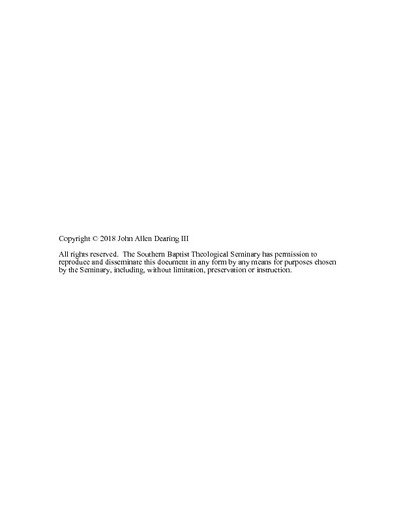Will Not Return Void: The Use of Scripture in Evangelistic Writings in the Greek Patristic Tradition
Subject
Fathers of the church--HistoryChristian literature, Early
Evangelistic work--History--Early Church
Abstract
ABSTRACT
WILL NOT RETURN VOID: THE USE OF SCRIPTURE
IN EVANGELISTIC WRITINGS IN THE
GREEK PATRISTIC TRADITION
John Allen Dearing III, Ph.D.
The Southern Baptist Theological Seminary, 2018
Chair: Dr. Timothy K. Beougher
When one considers the early Christian church, one is immediately struck by the exponential growth that the church experienced. The inevitable question one must ask when considering the early church’s rapid rate of growth is, how did it happen? While social forces, plagues, politics, and ideology competitions were certainly factors in the growth of Christianity, one would be remiss not to consider the methodology behind the considerable evangelistic effort made by the patristic church. This dissertation analyzes the use of Scripture in the apologetic and evangelistic writings produced by Christian leaders within the Greek patristic tradition and their belief that Scripture was the primary tool given by God for the conversion of souls.
Chapter 1 defines important terms and states the case for researching the Greek patristic tradition’s use of Scripture in evangelistic writings.
Chapter 2 explores the life and ministry of Justin Martyr, examining how he interpreted Scripture and how he employed it in his First Apology, Second Apology, and his Dialogue with Trypho.
Chapter 3 examines Origen’s theology of the Scriptures and how his understanding of the Scriptures were manifested in his apologetic, Against Celsus.
Chapter 4 considers the ministry of Athanasius, focusing upon his understanding of the sufficiency of Scripture and his reliance upon the Scriptures in works such as Against the Pagans and On the Incarnation.
Chapter 5 considers John Chrysostom and his theological and practical understandings of the Scriptures and how those understandings guided his apologetics in his Discourse on Blessed Babylas and against the Greeks and Demonstration against the Pagans That Christ Is God.
Chapter 6 focuses upon the work of John of Damascus, considering his understanding of the Scripture’s role in salvation and his reliance on the Scriptures in The Heresy of the Ishmaelites.
Chapter 7 concludes the dissertation with an examination of the Greek patristic tradition’s view of the use of the Scriptures in the task of evangelism and the implications for modern evangelicals.

